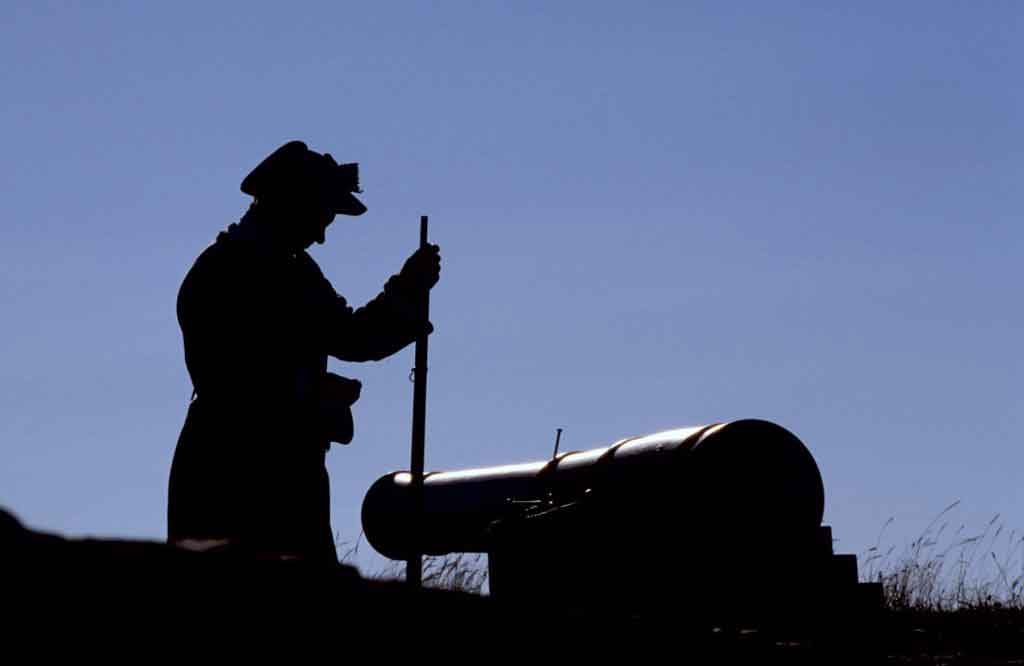Have you ever tried to quickly clean up the house before last minute guests come over? Heart pounding down the seconds until their obnoxiously presumptuous fists knock on the door, you do a little frantic shoving, maybe commit a little bit of treason, and hope the house looks presentable.
April 19th, 1775, 3 AM: 65-year-old farmer, Massachusetts Provincial Congress member, and local militia commander Colonel James Barrett lay sleeping next to his wife Rebecca in their farmhouse two miles outside of Concord Center. The fields around their home and nearby mill were quiet in the darkness - and full of artillery and stores needed to support a Continental Army in the making.

Barrett Farm
| © Save Our Heritage FoundationIn the distance, the town bell started frantically ringing and a few moments later horse’s hooves galloped to a fast halt outside Barrett’s home. A messenger shouted for Colonel Barrett to awake! The King’s troops were coming to search the town and seize the war supplies. Not a moment or a head to lose for treason, up sprang Barrett and his wife.
For months now, the colonists had been amassing weapons and provisions to supply their own army if needed. The supplies were being stored in both Concord and the farther-west town of Worcester. Barrett, a member of the Provincial Congress’s Committee of Safety, was responsible for overseeing the collection and security of the supplies in Concord, the majority of which were stored on his farm.
Like spiderwebs, extensive networks of both Loyalist and Patriot spies invisibly stretched over the Province of Massachusetts Bay, secret messengers constantly on the move. In March of 1775, General Thomas Gage, the royally appointed military governor of Massachusetts, received a tip that provisions for an army were being collected in Concord. Gage began to gather information and plan a response.
Back in Concord, Barrett wrote a detailed inventory of the items under his watch. His list included cannons, mortars, musket balls, cartridges, flints, gunpowder, medical supplies, tents and tent poles, dishes and spoons, barrels of dried food, and more. And then the list fell into the wrong hands.

Unwelcome visitors at Barrett’s Farm
Their name unknown to history, a loyalist spy, likely a citizen of Concord, acquired Barrett’s list and sent it to Gage. Writing in French as a form of disguise, lest the average simply-educated colonist came across the correspondence, the informant also provided a detailed, hand-drawn map of Concord showing: the main access roads; the North and South Bridges that should be secured in case colonists tried to move supplies over them; Barrett’s farm; and other houses and barns in which military stores could be found.
Now well informed, Gage told the British army to prepare for an expedition to Concord in the coming days.
In the daylight of April 8th, observing sudden increased activity of British troops in Boston, Paul Revere rode from Boston to Concord and alerted Colonel Barrett to his suspicion that the British were readying to march to Concord to capture the supplies.
Immediately, Barrett and other members of the Committee of Safety began moving the stockpiles. As described in Shattuck’s 1835 History of Concord, “four cannon were carried to Stow, six to the outer parts of town, and some others covered with hay, stra[w], manure…. Loads of stores of various kinds were carried to Acton, and other towns, and many others were concealed in private buildings in the woods.”
Ten days passed; enough time to move most of the arsenal and reduce signs of stockpiling for an army.
April 18th: General Gage sent this order to British Officer Lieutenant Colonel Smith: “Sir, Having received intelligence, that a quantity of Ammunition, Provisions, Artillery, Tents and small Arms, have been collected at Concord, for the Avowed purpose of raising and supporting a Rebellion against His Majesty, you will March …with utmost expedition and Secrecy to Concord, where you will seize and destroy all [the above]. But you will take care that the Soldiers do not plunder the Inhabitants or hurt private property…. You will observe by the [map] that it will be necessary to secure the two Bridges as soon as possible….”
Just before midnight, Lieutenant Colonel Smith and nearly eight hundred British troops left Boston.
Again, Paul Revere was watching. Revere, and other network riders, galloped ahead of the British, spreading out over preset routes awakening the colonists and spreading the alarm that the regulars were coming out!
In Lincoln, a British patrol captured Revere, ending his midnight ride, but Concord doctor and fellow rider, Samuel Prescott, carried the message into Concord center alerting the Minutemen on night duty. Word was out! Minutemen and militia from near and far began a swift journey towards Concord.

Searching Barrett’s Farm
| Courtesy of Save our Heritage FoundationApril 19th: Up at the Barrett farm, an awakened Col. Barrett turned his attention to concealing whatever artillery was left. Inside the house, Rebecca raced up and down to the attic, stashing musket balls, cartridges, flints, and other small items in casks, and then covering them with feathers.
Dawn arriving, Col. Barrett, rode into Concord Center and rendezvoused with the Minutemen and militia who were continuing to grow in numbers. Agreeing with the Concord men to observe and not instigate confrontation with the now arriving British troops, Barrett raced back to his farm to continue concealment efforts. In a story later told by his great-granddaughter to Concord writer Margaret Sidney, Barrett and men at his farm began rapidly ploughing two furrows. Barrett left them moments before three companies of British soldiers (~225 men) arrived at his farm. The men calmly continued working the fields discreetly dropping muskets into one furrow and covering them with dirt from the other. Despite a search of Barrett’s house and farm, the troops found few signs of a significant arsenal.
Barrett rejoined the Minutemen and militia by the North Bridge, just in time to give the order for the colonists to march to the town when they mistakenly thought it had been set on fire. Thus began the first steps to the battle at the North Bridge and the shot heard ’round the world.
Forty days later, when news of the events and British retreat from Concord reached King George III, the monarch wrote, “Lieutenant General Gage may not have been strong enough to disperse the Provincials assembled at Concord….[but] the object of sending the detachment was to spike cannons and destroy military stores, this has been effected….”
Unfortunately for King George III, he was wrong. Thanks to Colonel Barrett and those under his direction, most of the military stores had been saved and the Continental Army was just getting started.
Places to Visit
Colonel James
Barrett House
448 Barretts Mill Rd., Concord, MA.
View from the outside or check with Minute Man National Historical Park for special events and open hours.
Concord’s North
Bridge & Visitor Center
174 Liberty St., Concord, MA.
Minute Man Visitor Center in Lincoln
250 N. Great Rd., Lincoln, MA.
View their excellent multimedia presentation.
Source list: email Barrowbookstore@gmail.com


